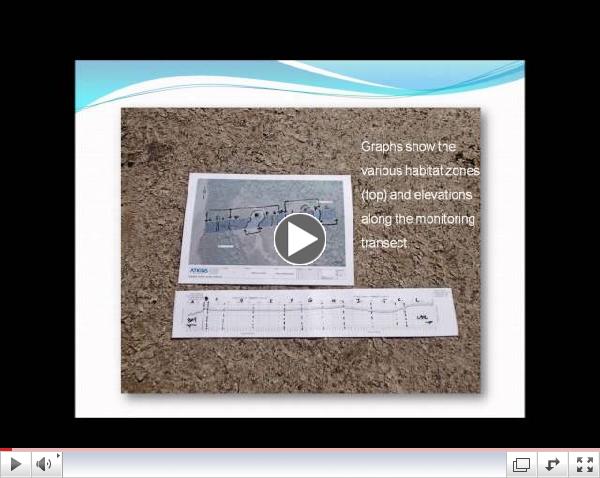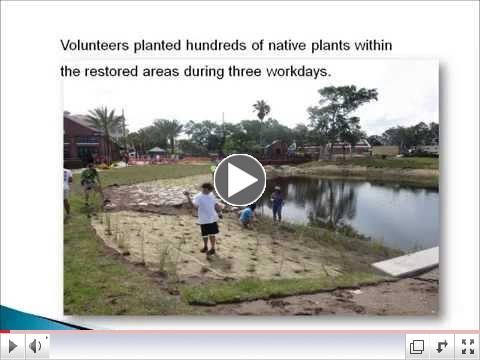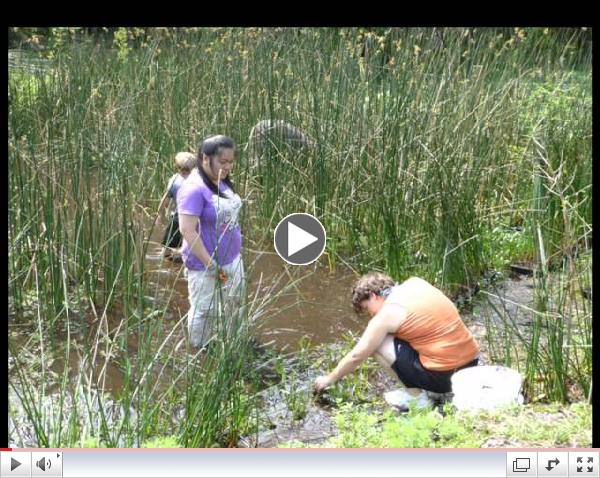Taking The Long View: Pilot Project Aims to Track Coastal Habitat Changes Over Time
A site in northern Tampa Bay is being used to test
methods for monitoring how coastal habitats respond to long-term changes in climate and water levels.
The pilot project, jointly funded by TBEP and the U.S. Fish and Wildlife Service, is the first step in creating a comprehensive plan to monitor the impact of climate change on the bay's mangroves, salt marshes, salt barrens and coastal uplands. The plan is designed to detect both small- and large-scale changes in abundance and ecological function of these vital habitats, to better help bay managers prepare for and adapt to the changes.
TBEP has contracted with the consulting firm Atkins Global to conduct the work. A team from Atkins. Ecological Science Associates and TBEP conducted a field test of monitoring techniques and tools at Upper Tampa Bay Park in summer 2014. They collected baseline measurements and established permanent fixed-station monitoring grids across the full range of coastal habitats from the water's edge to upland areas.
The stations will enable scientists to document changes in plant species and abundance, land elevation, water levels, and salinity gradients over time. This pilot project will help determine the most time- and cost-saving monitoring techniques, so we can expand our studies to more sites around the bay.
 | | Watch a short slideshow about the coastal habitat monitoring project |
|
|
Golden Mangrove Award Honors Spring, Lake Restoration Efforts in Tampa/Hillsborough
The rejuvenation of a neglected natural spring along the Hillsborough River in Tampa, and the restoration of a canal leading to a residential lake near the Florida State Fairgrounds were co-recipients of the Golden Mangrove Award as the outstanding Bay Mini-Grant projects for 2012-2013.
The award is given annually by members of TBEP's Community Advisory Committee to the Bay Mini-Grant -- or, in this case, two grants -- that best combines citizen involvement with environmental results.
 | |
Tom Ries receiving award from
CAC member Kristin Lehman
|
Ecosphere Restoration Institute, led by Tom Ries, was honored for the comprehensive Ulele Spring project that reconnected a long-forgotten spring near downtown Tampa with the Hillsborough River to provide a quiet refuge for manatees. The project opened up the spring flow and restored the river shoreline adjacent to the spring. TBEP grant funds paid for native plants that were installed by volunteers in and around the spring head. Ulele Spring has become the centerpiece of Tampa's new Water Works Park, which features a playground, concert pavilion and a popular restaurant.
 | | Watch a slideshow about the Ulele Spring Project |
The East Lake Park Homeowners Association, led by Hal Hart, restored a canal leading to this highly modified lake just east of Tampa. More than 800 volunteers removed invasive plants such as water
 | |
East Lake Park's Hal Hart receiving award from Kristin Lehman
|
hyacinth and hydrilla and replanted the canal shoreline with 2,300 native aquatic plants -- including bald cypress, giant bulrush and pickerelweed. These plants are helping to filter the more than 28% of the lake's stormwater load that flows through this canal. The group also conducted two educational workshops to teach residents how to reduce their impact on the lake and other waterways.
 | | Watch a slideshow about the East Lake Project |
These projects exemplify the impact that a dedicated group of volunteers can have with the $5,000 available to community groups through the Bay Mini-Grants.
"The 2012-13 grant cycle was a banner year for exemplary Bay Mini-Grant projects," said CAC member Kristin Lehman, chair of the Golden Mangrove Award committee."Consequently, two outstanding projects have been selected to receive the Golden Mangrove Award. The two projects are drastically different in scope and reach but they both are outstanding in their own right."
Funding for Bay Mini-Grants comes from sales of the
|
|
Marine Quest "School Daze" and Open House
 | |
TBEP Staff and Community Advisory Committee members led 5th and 6th grade students in an interactive "Spinning For Survival" activity at the Fish and Wildlife Research Institute's "School Daze" in October. Students attending the 2-day event rotated through various learning stations.
At the TBEP tent, the kids spun a roulette wheel to pick a number corresponding with a native or invasive animal, and then tried to toss a beanbag into a target associated with their critter. If they succeeded, their animal survived. Many more invasives than natives survived, illustrating how invaders can quickly outcompete native creatures for food and habitat. Above, CAC member Nadine Nickeson explains the game to a group of students.
|
"Give A Day For The Bay" Workdays Are Back
Students from Eckerd College, above, were part of some 50 volunteers who showed up September 27 at Fort De Soto Park for the kick-off of our 2014-15 Give a Day for the Bay workday program. The date coincided with National Estuaries Day. We planted some 10,000 sea oat seedlings and dune sunflowers at the North Beach with assistance from park staff. Thanks to everyone who helped blanket the beach with native plants! 
On November 15, 40 volunteers gathered at Robinson Preserve in Manatee County to help fill mesh bags with oyster shells. The shell "reefs" will be used to help prevent shoreline erosion in the preserve. |